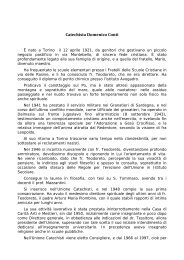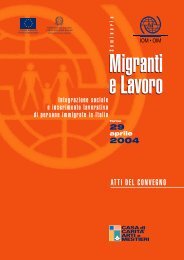Rapporto finale/ Final Report (ITA-ENG) - Casa di Carità Arti e Mestieri
Rapporto finale/ Final Report (ITA-ENG) - Casa di Carità Arti e Mestieri
Rapporto finale/ Final Report (ITA-ENG) - Casa di Carità Arti e Mestieri
Create successful ePaper yourself
Turn your PDF publications into a flip-book with our unique Google optimized e-Paper software.
61<br />
These activities should be compulsory and included in the final examination. This implies a specific<br />
choice by schools as a whole and head teachers in particular, and requires investments in terms of<br />
teachers’ and pupils’ time and allocation of resources. In some cases, for example, as in that of the<br />
Spanish partner, the project received strong backing from the school leadership, which judged the<br />
project highly innovative and with great potential for the pupils, to the point of deci<strong>di</strong>ng to continue<br />
the experiment in the coming years, as a permanent space where pupils are the protagonists.<br />
For Dialogue Space activities to be fully effective they must necessarily be included in the schools’<br />
curriculums. If not, engaging pupils and teachers can prove extremely <strong>di</strong>fficult (as observed in some<br />
of the experiments conducted under the Cross Community Schools project), especially due to the risk<br />
of over-burdening them with work. By contrast, if embedded in the curriculum and school hours, they<br />
could help to significantly improve practices and actions in the <strong>di</strong>alogue on <strong>di</strong>scrimination. When this<br />
was done it was possible to allocate a fixed time for meetings, which were held at regular intervals,<br />
making it easier for pupils to take part and enhancing the visibility of the project within the school.<br />
To make the place more welcoming and accessible, it was equally important to guarantee flexible<br />
opening hours in order to adapt to the <strong>di</strong>verse needs of learners and teachers.<br />
In many cases, the presence of a facilitator and me<strong>di</strong>ator in the Dialogue Space was important in<br />
order to promote and manage activities in the best way. Thus, acquiring specific skills (for example<br />
in group management, solving interpersonal conflicts, lea<strong>di</strong>ng group <strong>di</strong>scussions) also appears to be<br />
important, in order to run the Space and manage the interpersonal dynamics of a meeting place open<br />
to young people. Particular emphasis was placed on this point in some countries. In Spain, for example,<br />
where work is being carried out to make the Dialogue Space a permanent activity, a facilitator<br />
with expertise in the areas outlined above is always present, as this need emerged clearly during the<br />
two-year experiment.<br />
Practical suggestions<br />
The Dialogue Space can be a useful place for drawing attention to and focussing on the<br />
question of challenging <strong>di</strong>scrimination and stereotypes at school.<br />
To optimise functioning, Dialogue Space activities must take place in school time and be part<br />
of the school curriculum.<br />
The Dialogue Space must be pleasant and welcoming and must be open to everyone and to<br />
all types of <strong>di</strong>alogue.<br />
The Space must be easily recognisable and highly visible.<br />
Engaging pupils <strong>di</strong>rectly in the process of installing the Space and organising the activities can<br />
be effective.







